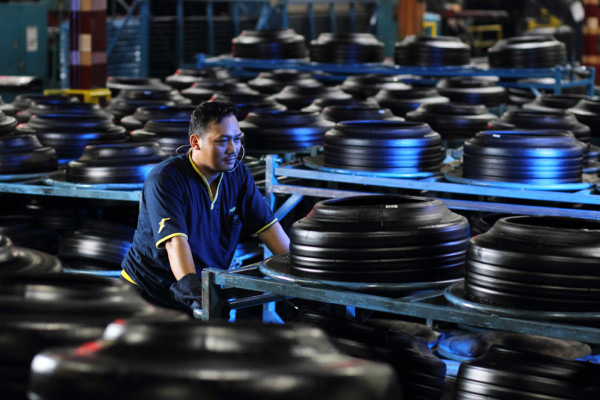Popular Reads
Top Results
Can't find what you're looking for?
View all search resultsPopular Reads
Top Results
Can't find what you're looking for?
View all search resultsGovernment encourages innovation to reduce raw material imports
The Industry Ministry has expressed hope such products could help it meet the target of slashing Indonesia’s raw material imports by up to 35 percent to US$82 billion in 2022.
Change text size
Gift Premium Articles
to Anyone
T
he government is calling on companies to boost their research and development to produce import substitutes to help reduce Indonesia’s reliance on foreign goods.
The Industry Ministry has expressed hope such products could help it meet the target of slashing Indonesia’s raw material imports by up to 35 percent to US$82 billion in 2022, said Gatot Sudariyono, an expert staff member at the ministry.
The goal is to increase the share of local components used by businesses, called TKDN, to 53 percent by 2022.
“Going forward, as we do not know when a COVID-19 vaccine will be available, we are nudging local industries to produce import substitutes,” Gatot said during an online talk on Friday.
Indonesia’s raw and intermediary goods imports declined last year and during this year’s January to May period, signaling a cooling of manufacturing activity and household demand. Last year, imports totaled $125.9 billion, down more than 11 percent from 2018, Statistics Indonesia (BPS) data show.
As of May this year, the decline continued, with imports dropping 15.28 percent year-on-year (yoy) to $45.16 billion.
Lockdowns and physical distancing measures implemented in countries around the world to contain the COVID-19 pandemic have sapped global commerce by disrupting supply chains and forcing factories and stores to shut down.
The World Trade Organization (WTO) projects global trade to shrink by between 13 and 32 percent as the scale of the economic impact of the health crisis remains uncertain.
Indonesia has not been immune to the pandemic-induced worldwide slump in trade, with its total imports down 42.20 percent year-on-year to $8.44 billion in May. Its exports also fell 28.95 percent to $10.53 billion over the same period.
Despite declining imports, the government remains wary of industries that rely heavily on raw materials or intermediate goods made overseas, said Gatot. The pharmaceutical industry, for instance, sources 90 percent of its inputs from other countries.
Read also: Indonesia faces trade remedies from partners, risks $1.9b losses
The government is trying to accelerate innovation through its Industry 4.0 program in select industries, namely pharmaceuticals, health care, automotive, fashion, electronics, chemicals and food and beverages, by focusing on the use of digital technology.
The Finance Ministry is currently developing a super deduction tax scheme to provide businesses with incentives to conduct research and development in the hopes of spurring innovation, according to Finance Ministry Fiscal Policy Agency (BKF) head Febrio Kacaribu.
Febrio said Friday that businesses might also benefit from the planned incentives by developing research and development related to COVID-19 response.
“The fiscal incentives for research and development have been prepared since the start of the year, but the program has been hindered by the COVID-19 pandemic,” said Febrio. “We are currently finalizing it to make sure it is launched soon.”
Bawono Aji, a partner at DDTC Fiscal Research, which provides tax consultancy services, said Friday the government could also spur innovation by lowering taxes on innovative products, such as electric vehicles (EV).
EVs are currently subject to a luxury tax (PPnBM). However, as EVs are less harmful to the environment than internal combustion engine (ICE) cars, Bawono said the government should provide an incentive to manufacturers and buyers of EVs to encourage innovation.
“There are plenty of products that also have fewer negative externalities and we need to think about their innovation,” said Bawono.
The Jokowi administration wants the EV industry to begin production by 2021 or 2022, with output targets of 400,000 electric cars and 200,000 electric motorbikes by 2025. Some regional administrations have offered to lower the vehicle tax on electric cars, including the West Java administration, which has proposed dropping the tax rate to 2.5 percent – five times lower than the rate for ICE cars.










